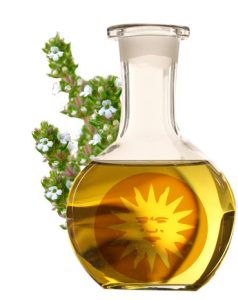White Thyme Essence (Thymus Zygis)
At Esencias Lorente, we are pleased to introduce our essence of white thyme (Thymus zygis), an aromatic and versatile option that adds a distinctive touch to a variety of products. Carefully extracted from fresh white thyme leaves through a specialized distillation process in stainless steel stills, our essence captures the fresh and herbaceous aroma characteristic of this Mediterranean plant.
With its distinctive aroma and beneficial properties, white thyme essence is appreciated for its stimulating qualities and its ability to promote well-being. Widely used in the perfumery industry and in personal care products, white thyme essence adds a refreshing and revitalizing note to a variety of products, from essential oils and lotions to soaps and household products.
At Esencias Lorente, we are committed to providing white thyme essence of the highest quality, produced with care and attention to every detail. Additionally, we are proud to have recognized quality certifications, such as ECO CERT certification and kosher certification, which support our dedication to quality and sustainability at every stage of our production process.
Description: Liquid essential oil which has a yellow whitish colour and a characteristic phenol spicy smell.
Bloom: As the red Thyme, it blooms in June and July.
Growth: It is cultivated in Murcia and Almeria.
Composition: As Red Thyme, It is mostly composed by Thymol, Para-Cymene and Linanol.
Use: It is used for food, pharmacy and perfumery.
TECHNICAL TABLE OF WHITE THYME ESSENTIAL OIL
ORGANOLEPTIC INFORMATION
PHYSICO-CHEMICAL INFORMATION
CHEMICAL COMPOSITION (Active Ingredients)
White thyme essential oil (Thymus zygis) features a complex chemical composition that endows it with various therapeutic properties. Some of the main chemical constituents found in white thyme essential oil are:
- Thymol: A component with strong antimicrobial and antioxidant properties.
- Carvacrol: Similar to thymol, it has potent antimicrobial and antioxidant properties.
- Linalool: Known for its relaxing properties and potential anti-inflammatory effects.
- Cineole (Eucalyptol): Contributes to decongestant properties and benefits for respiratory health.
- P-Cymene: Adds to the characteristic aroma of thyme and has antimicrobial properties.
- Terpinene: Attributed with antibacterial properties.
- Borneol: May have anti-inflammatory and analgesic properties.
- Geraniol: Another component that may possess antimicrobial and aromatic properties.
DESCRIPTION OF WHITE THYME PLANT (Thymus zygis)
White thyme, also known as common thyme or scientifically Thymus zygis, is an aromatic plant belonging to the Lamiaceae family, native to the Mediterranean region. This thyme species is characterized by its small silver green-gray leaves and its flowers that can vary in shades of white or pale pink.
Like other varieties of thyme, white thyme has a strong aroma and a slightly bitter and spicy taste. It is widely used in Mediterranean cuisine to season a variety of dishes, including meats, poultry, fish, soups, sauces, and dressings. The leaves of this plant contain essential oils that give it its aromatic and medicinal properties.
Among the benefits and uses of white thyme are:
- Antioxidant and antimicrobial properties: Contains compounds such as thymol and carvacrol, known for their antibacterial and antifungal properties that can help fight harmful microorganisms.
- Respiratory system support: Traditionally used to relieve cough, nasal congestion, and other respiratory problems due to its expectorant and antiseptic properties.
- Digestion and stomach discomforts: Consuming white thyme infusions is believed to help relieve mild stomach discomfort and improve digestion.
- Aromatherapy and relaxation: White thyme essential oil is used in aromatherapy for its stimulating aroma and is believed to help reduce stress and promote relaxation.
It’s important to note that while white thyme is considered safe in normal amounts used in cooking, excessive consumption may have adverse effects on some people. It’s always advisable to consult a healthcare professional before using any plant for medicinal purposes.
